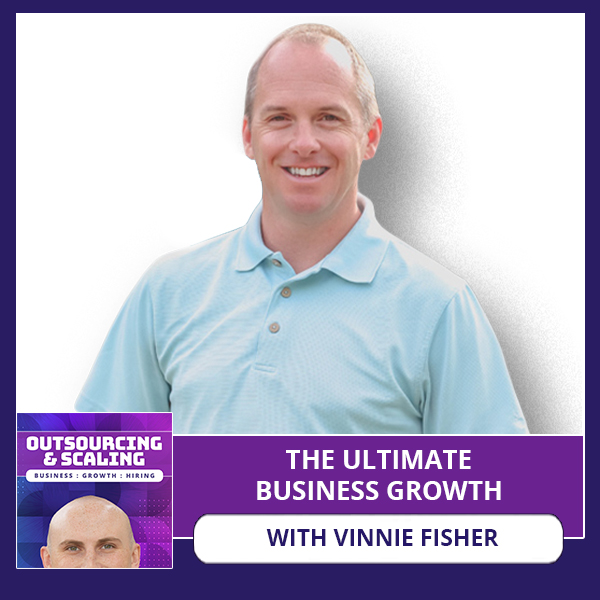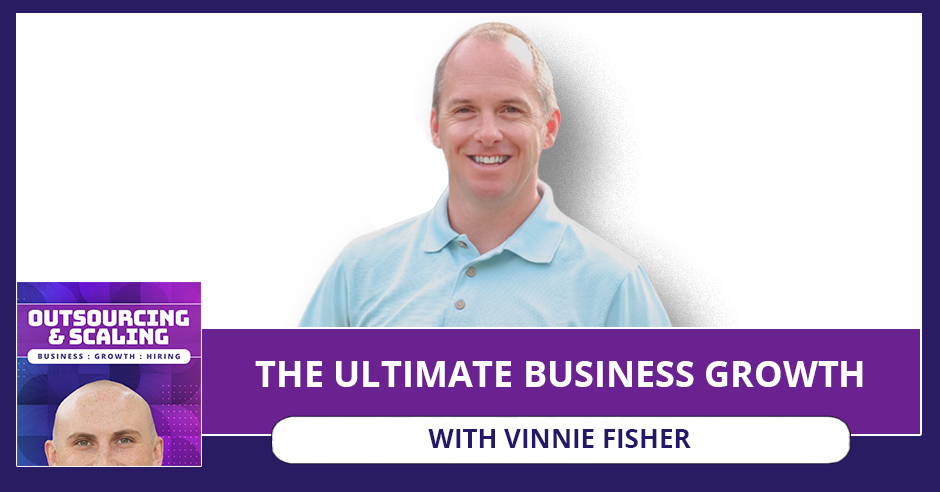


Growing your business is not, and has never been, a one-size-fits-all process, but many people who’ve found success in this endeavor have seen what won’t be helping you achieve. There are just naturally certain things you have to avoid in order to give your company a fighting chance to grow and achieve its potential. Vinnie Fisher, the Co-Founder and CEO of Fully Accountable, is a businessman, entrepreneur, lawyer, and author. Vinnie speaks with Nathan Hirsch about his experiences with growing various businesses over the years and the times when the company crashed before it could fully achieve its goals. Let Vinnie’s experiences inform your process going forward.
—
Listen to the podcast here:
[smart_track_player url=”https://www.podetize.com/statsapi/www.podetize.com/wp-content/uploads/fileuploads/11-5b145ef137b51b3d1af0633e9305c43d/02/2020/79da0fbabfd6537b15ca1aba78edad3a.mp3″ title=”The Ultimate Business Growth With Vinnie Fisher” artist=”Nathan Hirsch” image=”https://freeup.net/wp-content/uploads/2019/04/OAS.png” ]
Download the audio file here.
The Ultimate Business Growth With Vinnie Fisher
Our guest is a buddy of mine, Vinnie Fisher. Vinnie, how are you doing?
I’m good, Nathan. Thanks for having me on the show.
I’m excited to talk to you. You’re someone that’s all about the data, which is something that I personally struggle with, so it’s always great to talk to you. For those of you that don’t know, Vinnie is a businessman, entrepreneur, former lawyer, author, husband, and father. Vinnie discovered a much-needed service for business owners after starting a few successful digital businesses. In 2014, he co-founded and is the CEO of Fully Accountable, a full service, outsourced accounting, and finance firm for digital and eCommerce businesses. Fast forward several years later, Fully Accountable as a leader in the industry serving hundreds of companies in eCommerce and digital around the world. We’re going to talk about all of that, but first, let’s take a gigantic step back. What was you like growing up as a kid? Were you a straight-A student? Were you a rebel? Did you always know you wanted to be an entrepreneur?
I discovered I have a tendency to be inherently lazy. I’ve always been a very spontaneous person. You can talk to me about a good idea. I tend to be the life of the party at every party. I can be talked into a whim very quickly. I also learned that I’m a very quick start, but I don’t like to keep doing something. I saw that throughout all of my early childhood that I would get very excited about something, but then I would need an outside external force in a relationship like a coach or somebody who would keep pushing me to stay committed. That’s wrong, true in a lot of my career. I’m probably in the only position I could be in my company because I have to surround myself with excellent people in order for the thing to continue. I would look at some of my business accomplishments, failures or big strike-outs as me jumping off and wanting to do something else because I reached that point of that commitment factor.
Walk me through this journey. I know you went to law school. When did that mentality change? Were you always like an entrepreneur or was that something that you found yourself doing down the line?
I think I’ve been somebody who thinks that the only good spot in the room is the front of the room. I’ve always driven up there. I love to either be a leader or follow good leaders. It’s my makeup. Some of that’s because of the poor kid in me and wanting something way more than what was offered to me. Some of them are a little chip on the shoulder because I saw people had it and they’d say very negative things to me about what I wouldn’t get. Some of that wasn’t healthy. I remember my brother broke his arm and I took over his paper route and I did it better. His route and boss wanted me to stay doing it after he was better. That was always been my way. I’ve always been very entrepreneurial.
Talk to me about your first entrepreneurial endeavor. I know you mentioned a lot of failures. How did that first endeavor go? What did it look like? Was it you? Walk us through that a little bit.
It probably started after I blew my knee in college playing soccer for Canisius College. I got hurt. I needed a job. I didn’t have a family that could provide us anything. I was used to fending for myself. I needed to eat. I didn’t have the luxury of the college helping me with some of that stuff. I walked into a bar and applied for a bar back job. That night, I was literally the lead bartender, something I’ve never done at the age of nineteen. Within a couple of months, I was the manager of the place. Within about a year, I was in an ownership relationship as a minor with a bar. It was crazy.
It helped fund school, do all this stuff. I had a series of businesses while going through pre-law school. I had another one while I was in law school where my wife and I did tax returns and stuff. As the tax lawyer in me, I wanted to make revenue. Right out of law school, I had a big law firm while we had a side thing. A couple of years later, I owned part of my own law firm. I literally will join someone’s team with the express desire that I’m going to be a big part of that team. I don’t probably think like the average Joe when it comes to business and structure. I literally will always be building something.

I know your main focus is Fully Accountable. I think a lot of entrepreneurs, they go through, have different ideas and they come across one and they’re like, “That’s the big one. That’s where I’m going to put all my energy, all my passion into it.” How many different ideas did you go through and what stood out about this one?
I actually had bigger businesses. In our space, people have been like, “Vinnie, you’re a good marketer and good at growing companies. Why are you doing that?” I have a large web hosting company that I broke. I’ve tragically written about that in our books and I’ve been very honest and humble about it. That business should have been a $100 million company. I broke it. We were doing $40 million in revenue. I straight-up broke it with arrogance. I opened up a health and beauty line after that. In the health supplement space, we were doing very well. It was during that business, we were doing eight figures, doing $30 million run rate and revenue is when I figured out that I literally cared only about gross revenue and not the bottom line. It’s when we started the first early days of Fully Accountable.
I realized that Fully Accountable had legs after we had started it. I looked at the landscape of me believing I can run more than one thing at the same time. I realized that that was a massive lie that I needed to be dedicated to. I looked at the way I ran these other companies and I had to say to myself, “I’m the problem.” I had to dial in with laser focus to make something with excellence grow. If I do that and every day fight this temptation to have nine other things going, I think I could build something super special and we’re doing that. I don’t know that I ever envisioned owning an accounting firm. I’ve got to be honest with you. I don’t think as a digital marketer who left the law practice, I loved the product space and I still do but my ROI is on human labor and it works. I love how to figure out fractional outsource and I never envisioned being there. Now that we’re here, I have this stewardship and responsibility to lead it correctly and not do nine things at the same time.
Can you dive a little bit into what you did wrong? I know you said your arrogance with the web hosting company. I know you’ve written about it, but give us a little bit more information.
I was the CEO and founder of our web hosting company and it was big. At one point, we were taking more signups than GoDaddy was on a daily basis. I turned down a letter of intent to sell it for a big number because I thought I was going to grow it to so much bigger. I didn’t realize that I was more of a lever polar in that business. It was no joke. We were a big company, big customer service, big sales floor, people building websites before the technology even existed. Here we are in 2011 building things that everyone’s like, “Wasn’t that just a click of a button?” We were doing things that didn’t exist. I stepped away as the CEO thinking that another person could come in and run it. It wasn’t his fault. He’s a great guy. It was my fault. I was pulling more levers in that business than I was mature enough to realize this. When I stepped back wanting to chase another business, the thing went into free fall. We went from doing $4-plus million in revenue a month to $1-plus million in revenue a month. I did our best to pull the plane back up before it crashed and ended up sadly selling it for parts.
How do you make that decision? I think a lot of entrepreneurs see their business grow. They start getting interested in investors, from different people. Maybe they’re sending letters of intent. They love their business. They put an effort into it. How do you decide whether to take that offer? When’s the right time? You mentioned that you were more involved in the business than you actually thought. What are the different things that you’re weighing as that goes through your mind?
It takes a massive amount of maturity and sadly probably some strikeouts in that process. I think of the old adage, I’m a dad, I’ve got four kids. Your kids look prettier than everyone else’s is an adage or analogy that doesn’t break down. My vision of the equity of our company was far greater than the maturity I placed on the value of our business. I got caught up in the arrogance of that. A business goes through cycles. You can be an infant, startup, very toddler, adolescent stage, preteen and teen stage. I think that preteen and teen stage, most companies are in the preteen stage. It’s a mom-and-pop business. You’re in it, you’re running it, you step out of it. It’s in a lot of trouble.
When you get to the teen stage, which is where I thought we were, we were making a lot of cash. I thought that I had the arrogance to take some of that cash and chase other things. I thought my world domination plan would be to own more things while growing this. That was a massive disaster. In that arrogance, I thought we were going to go to $100 million with me being only partially committed. That’s just not the stories that get there. If you want the $100 million business, it’s about you fighting off all the other opportunities. About the most dangerous thing you can do as a teenager in business if you have enough cash, an opportunity is a devil and you have to fight those opportunities, and I didn’t.
I’m thankful now, but I look back with some regret. I don’t live defeated. I definitely live committed about realizing the honesty of it because it takes a vast amount of maturity to be able to look at a letter of intent or some opportunities. Fully Accountable, I have investment firms who are looking at us. I’ve signed NDAs, I let them look. Before, I had a resistance to letting people look. Now, I want feedback. I might not be for sale and maybe it’s too early, but if I don’t want to buy my business for myself in five years, why would I think anyone else would?

Even if you’re not looking for that investor, the investors are going to tell you everything that’s wrong with your business and why people in the future won’t invest. How many different businesses do you have your hands in?
I have a full-time job. I run Fully Accountable. That’s it. I have a couple of interests. I have a data company that’s run by somebody else. I invented the idea for him and acting as his chairman of the board. I helped to advise a couple of health supplement companies. They treat us well and all that great stuff. I have an interest in some real estate stuff, but nothing is the active operation for me. It’s all leverage, acquisition, use of dollars or me thinking like a board member. We run a mastermind, but that’s within the ecosystem of our company. We don’t treat it as a separate thing. It feeds back into our community at Fully Accountable. I have and continue to fight off this idea that I can run anything more than Fully Accountable.
This business is destined to be a large company and already is. I’m already in the top 1% of the size of what we do. In order to be that next thing, I have to fight taking cash and thinking I can build something else with me being its leader. I did it. A couple of years ago, I launched this thing called Total CEO. I thought, “How amazing. We’ll take on hiring.” The inflection point of it starting to grow a little bit and fully starting to feel the pain of not growing. With a lack of focus, I was starting to do it again, so I had to table that on the side. I have that disease of wanting gross revenue. I have to recognize I have to fight it. It’s not like it’s done. Every day I wake up with ten new ideas and every day I have to fight this thing. It’s a passion in me to grow something.
I don’t want to shut that off. One of the things that work well for me is I have to look at the problems inside of our company as opportunities to grow and treat those like business opportunities and not treat the new ones that aren’t problems as the grass is greener junk as the way to grow. I got the phone with a guy who was like, “I’m going to do this and that and I’m going to get to a million.” I love you enough to be honest with you. No, you’re not. I wish you the best, and I’m not trying to tell you not to try it. That everywhere thing will lead you to make a couple of bucks and then have nothing. I can tell you from a guy who has done that. I’ve had a couple of bucks and then I didn’t have any of that. It went away. Deb and I are fine. We make a great living and we have stuff. I was raised in the ghetto. We call them ten-cent millionaires. You have a bunch of cash in your pocket, but you don’t have anything.
I feel like a lot of people are preaching the multiple revenue streams. I’m in that same mindset of you. I’d made FreeUp. I’m 100% in. I have stocks and some other stuff that I do here and there, but my focus is 99.9% FreeUp at all times. Let’s talk about Fully Accountable and the setup. I want to take a step back. Who is your first hire and how did that go? Do you remember?
To go back to be completely full of character and integrity and stay consistent with our conversation. I was our first seven companies. That’s how bad I had it. I had three health supplement companies, a data company, an affiliate business and all of that where our business is. That’s how awful I had it during that time. I thought I could have all these things. We launched it to the world after we got it working. My friend buddy, Ed O’Keefe, was our first client. He was like, “This is amazing. You’ve got to do this for us.” We came along for the ride and help Marine Essentials grow up and be big. He went off and got distracted and chased nineteen things, but he was the first guy and then a couple of other people. You asked the question about Fully, but our first client who was external was Ed.
Who is your first hire?
I believe something a little different than most people. I’ve learned enough in business to not go at something with my personality. Everybody has to evaluate this differently. Because I have a quick start and I don’t want to stick around and do some of the hard stuff, I realized I cannot go launching a business alone. I’ll take most of the risk. I’ll invest and build the strategy and leverage. I don’t want to go alone, so I partnered. My first move was to find the right partner to do this with. My two operating partners are Chris, who is a CPA. I have to unlearn every day from him this idea of traditional old school stuff. I have Rachel, our COO, who also is a partner in the business. I first secured that. I’ve learned along the way. I’ve put almost $500 million on the board. I’ve had a few dollars run through some merchant accounts. I’ve learned things about people. One thing I know for sure is at the partnership level, if you have to do it all alone yourself, especially with my kind of personality, quick start and not invest in some longer-term stuff, you’re going to be in trouble building something bigger than yourself.
Can you talk to us about the set up of Fully Accountable? I know you said you’ve got people that are in your office, you’ve got some remote, you use VA’s and contractors. Walk us through that structure.
I want to be clear. We believe in the concept of a super employee. We believe that the stats are true. A Harvard study has been commissioned multiple times over generations. On tilt, your best productive member of your team, we call them team members instead of employees, your best employee is going to yield about 60% of their salary on tilt because you have so much busy stuff. Along the way, I’ve learned that in our businesses, we have what’s called a super employee mentality. Every technician in our company has its own contractor who is a technician. You might call a virtual person who works for them to fill in 20% to 25% more utility. Our people become 80% to 85% useful in their salary. A lot of the high production work is done for him or her.
Our structure is this way. We have a corporate office. We have 75-ish people on our team. We have about eighteen or so in our corporate office. We have what’s called the homeys. These are our accounting professionals that work from home. One of them came up with that title, it’s stuck, we love it and it’s part of our culture. Everyone who works here and every homie has their own technician, including me. Every one of our people is a super employee. When you add those together, we’re about 80-ish or so people. The way we run our model is we don’t take anybody who works for us and have them any relationship directly to the client because they’re not client-focused. Their client is us. We don’t use a fractional contractor. Everyone’s full-time for us. Interns that are local here who want an opportunity to work through our corporate office can have some part-time relationship. Everyone else is full-time to us. We made the decision to build this super employee. This way our people are capable of doing more work, more objective work, higher satisfaction. That’s how our model’s built.
How do you communicate with all these people? How many people are you talking with on a week-to-week basis? How many people are getting managed by others? What’s that communication stream?
I believe in an org chart. I’ve learned over time. I used to be very flat. I told you, I was pulling more levers. I was talking to as many people as possible to keep them working. My job is very tilted like I’ve learned in parenting towards the oldest. I give most of my time to my oldest and then trickle down from there. In our business, the vast majority of my time goes to our COO. The other amount of my time is spread out mostly to the rest of our executive team. Our executive team including me is seven people. They almost all directly report to her, my COO and then I run executive team meetings, leadership stuff. I’ll pop in and deal with them, sales director or director of finance, on need-based stuff or they have access to me on need-based stuff.
In addition, I also wear some functions at the office. I’m a good brand ambassador. I’m pretty good at our business development team. I liked those two roles so I pinch-hit very regularly. Those are where my duties go. I have a function as the chief leader. I will pop into at least one out of every four of our company meetings that happen every Monday and talk about vision, mission, strategy, acquisition, growth, rah-rah cheer about what’s going on with training, industry. I don’t do day-to-day with anyone below our executive team. I might have a little of that but most of that happens in my marketing department.

Let’s talk about data. I feel like that’s where I personally probably struggle. I know a lot of entrepreneurs struggle with that. Why is data so important? Where do you see most entrepreneurs going wrong?
Maybe it’s just a trend but it’s gone on for a long time. This is the new trend in our community where people are like, “I’m going to get to the next level. I want to 10x this thing.” They make these big statements about gross revenue. I can say they because I need those statements too. I’m being completely honest in the way I would think I’d want to grow a business. I serve the god of gross revenue. I think it solves all the problems and that’s an awful tree. One of the things I realized is that good sharp man and women like you and I who are the leaders of our thing, if I can get us to actually recognize that we need better data, if I can get better data, then I know that I’m capable of making better decisions to grow our business.
Our mission is to help Nathan realize that he needs better data. If you realize you need better data, then the next question is, what are you going to do to invest and get that? The only thing we do at Fully Accountable is filled into that gap right there in the investment. If you don’t make the mental decision to decide to invest the time, money and resources to go and get better data, then you’re describing some crappy service or dashboard or thing and think you’re going to get there. The reality is a business to grow past that startup infant phase has to get better data. What are you going to do to get it as the CEO or executive team of your business? If we can get you to realize that or if this show got you, “I need better data. If I have it, I’ll make better decisions,” we can see more heroes in their company. You can say, “If that’s true, how am I going to get there? Am I going to do the work? Is someone else going to do the work?” I need the information produced for me. I need good information. This shouldn’t be a race to the bottom of how cheap can I have something done? What information am I missing so they can make the right decision to 2x or 3x my company or go after the right marketplace or spend the right money to acquire a customer or reengage the customer?
That’s our entire model. To say like, “We sell CFO services or bookkeeping,” it misses the entire point because now the light is shined on us and not on the real problem that happens in these businesses. Once a business owner realizes if you can get better data, you can make better decisions, then all of a sudden the benefit of us as a company and you say, “Wait a minute,” you can spend a fraction of the money. You can get done all the time you need it back so you can work on your business and you have way more resources. Our core offer of a bookkeeper, a controller, a dating analyst, and a CFO, all in one package for cheaper than an entry-level person in your building starts making a lot of sense. Four jobs can get done for cheaper than an intern. All of a sudden you’re like, “That’s the way I’m going to get better data so that I can make better decisions,” not, “I need my bookkeeping done.”
Can you give us an example of a company where the data was eye-opening? When I think of the most basic example of data, I think of the McDonald’s story where the guys who bought it, they look at the menu and they say, “We’re selling all these products but 80% of our products come from hamburgers, milkshakes and French fries. Let’s get rid of everything else and just focus on that.” Do you have any examples of that in the digital agency or the digital industry?
You could literally log on to our page and look at our testimonials that are legit one after another. My friend, Drew Canole, the Organifi, the reason why he stayed with one product for so long is that we were able to help him dial into the data. He can make wise decisions. That thing’s a beast and we’re so thankful to have been on that team doing all that work. I also think about like Craig Collins and Danette May, they are rock stars. First off, just like Organifi, we love their products. Forgetting all that, that little commercial for them, we love being on their teams. When they were able to look at real data to be able to notice that don’t go chase 80 products, go after these actual things that are needle movers in your company. Look at them, they’re ridiculous. They’re a beast.
It’s the same about our friends over at Truth About Cancer. I get sick of everyone who brags about us. Ralph Burns over at Tier 11, all these people will tell you, “I was able to get my hands on real data so I can make better decisions,” and that was it. I can say to you that we have people who answer the phone faster. We have experts and they’re good at it. It was actually helping be the accounting piece and the finance piece to the executive team. They were the ones that grew up this big business and we just love being mentioned in the footnote credits of the movie but they’re the heroes.
I have very direct examples of helping people fight off having too many products, having too much stuff, not defending a profit margin at the bottom and these people had exploded. I have a couple of early ones that are excited about it. Emily Lark, who is a big player over at ClickBank, started early on with us and I suspect she’s going to be another hero story on this. She’s awesome. She’s a rock star and she’s getting it. If I’m equipped with this stuff, I can take this thing to the moon. Not like, “What are they going to do?” We’re going to free up you doing something much bigger in your business.

What else did I miss when it comes to data and Vinnie?
I’m sad about people thinking that they buy a tool and it solves their problem. The only problem that the tool solves hopefully is time. This world of automation is dangerous for you and me as marketers. I’m not down on tools, we use a bunch of them. This magic aspect that you and I have all these responsibilities to grow a seven-figure business and do so much with it. We have an economy of payroll and all these people who were responsible for us. Somehow we’re being sold these magic automation hacks that take away the real work. We sell labor because we do the real work and I would love for business leaders to remember that. That grit and effort that got you here, that’s not going to change. The only thing I want you to do is to realize maybe because of outsourcing and stuff like you, you can invest in ways to fractionalize your time and let other experts do things for you so that you can do the best part for the business.
I love it. Thank you so much for coming on. Where can people find out more about you and what are you most excited about?
I’m excited about what’s going on Fully Accountable. You can see us at FullyAccountable.com. You can get a hold of me at VinnieFisher.com. I am our brand ambassador. I’m very accessible on social media channels like Twitter, Facebook, and LinkedIn. You can get ahold of us all there. What I’m most excited about is I’m reading a book called Buy Then Build. I’ve always been a builder, not for myself. Even though I was an M&A lawyer and a corporate guy, I helped other people buy stuff, but I never bought anything for myself. I’m looking at how the acquisition is going to take us into late-stage eight figures and how that leverage point. We’re launching an office in Toronto. Some of that’s going to come through acquisition. We’re considering what would be an acquisition of a very friendly company that has the same client base as us. I’m thinking much bigger about the expansive growth of Fully and that’s what I’m excited about.
Thanks for coming on and I’m sure we’ll talk soon.
Thank you.
Important Links:
- Vinnie Fisher
- Fully Accountable
- Total CEO
- FullyAccountable.com
- VinnieFisher.com
- Twitter – Vinnie Fisher
- Facebook – Vinnie Fisher
- LinkedIn – Vinnie Fisher
- Buy Then Build
About Vinnie Fisher
 Vinnie Fisher is a businessman, entrepreneur, lawyer, author, husband, and father.
Vinnie Fisher is a businessman, entrepreneur, lawyer, author, husband, and father.
Vinnie discovered a much-needed service for business owners, after starting a few successful digital businesses. In 2014, he co-founded and is the CEO of Fully Accountable, a full service, outsourced accounting and finance firm for digital and eCommerce businesses.
5 years later Fully Accountable is the leader in the industry serving hundreds of companies in eCommerce and Digital only.
